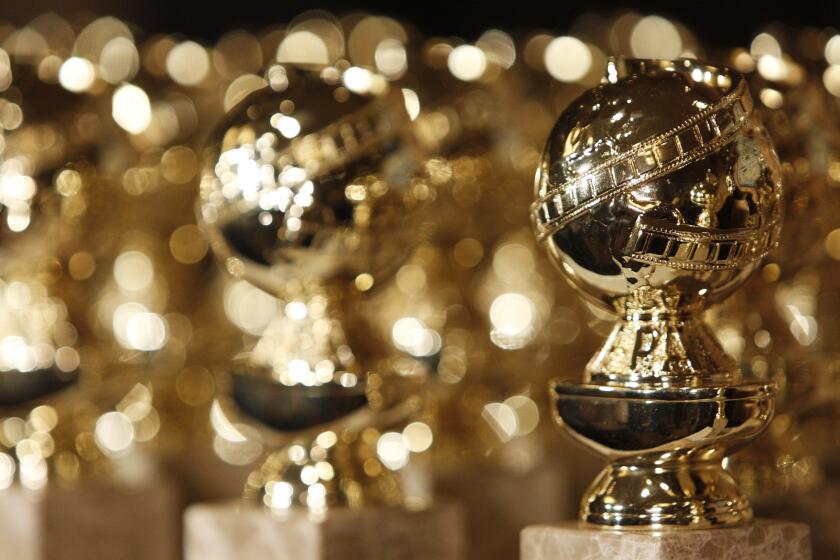Omar Sy of ‘The Intouchables’ hits his stride
- Share via
“The Intouchables” can justifiably be called an international sensation. Having taken in more than $414 million worldwide, including some $13 million in the U.S., is impressive enough. That the film is a French comedy-drama based on a simple story of two men makes it all the more impressive. The film is also France’s submission for the foreign language Academy Award, a prize the country has not captured now for 20 years.
In it, actor Omar Sy plays Driss, a resident of the drab, poor suburbs outside Paris who applies for a job as a caretaker for a wealthy quadriplegic aristocrat in the city. He has no experience, and no real interest in the position. He applies simply to get his assistance form signed, to prove he made the effort to find work and was turned down. But, on a whim, the aristocrat hires him, which will prove transformative for them both.
Although the tale is based on a true story, the role of Driss was tailored to the 34-year-old Sy, born in France to African immigrant parents, by the writer-director team of Olivier Nakache and Eric Toledano. A longtime presence on French television as part of the comedy duo Omar and Fred, Sy had acted in a number of films prior to “The Intouchables,” but this was his first lead role. The part won Sy the best actor prize at the Césars, France’s equivalent of the Academy Awards, beating out the likes of his costar François Cluzet and the Oscar-winning Jean Dujardin of the “The Artist.”
THE ENVELOPE: Awards season has arrived
Sy is currently in the middle of a planned year living in Los Angeles with his wife and four children. As Sy studies English some two hours a day while also working on a screenplay for an “Omar and Fred” movie, his charm and good humor could open some Hollywood doors.
Why do you think the film was such a big hit in France?
I think it was perfect timing. Now in France, there’s a certain fog, people can’t see the way. And the movie is a small light, it speaks about friendship, love, hope; it rings true with everyone. It was a good feeling for everybody, to feel that something good is possible.
The film has generated a lot of cultural criticism, about the divide between classes, treatment of the handicapped, and other issues. Where these things discussed at all while making the film?
It was a story about two guys. In our country, we know our country, our society, so it was just two guys in France. And that’s it. Of course, one is more aristocratic, the other is from the suburbs, the projects. The two guys both live in France but it’s two different Frances. And if it wasn’t for the accident [that disabled Cluzet’s character], they would have never met. It was an accident, but finally it’s a happy accident.
Were you surprised then that the film spurred the sort of big-picture cultural conversations that it did?
In France, I don’t know if it’s the same in America, comedies are cheaper movies, they’re not taken that seriously, it’s not “le cinema.” But the subject of the handicapped, the suburbs, all are big subjects in France. And I never thought it was odd that it was a comedy that brought that out. I believe comedy is the best way to make people understand something.
You’ve worked with the writing-directing team of Olivier Nakache and Eric Toledano before and they wrote this part especially for you. What was that like for you?
About 10 years ago, they came to me and asked me to be in a [different] movie and I said I can’t because I’m not an actor, I can’t be an actor and they said, “That’s OK, we’re not really directors.”
It was true for me. It was difficult to call myself an actor, I was just a comedian, not an actor. For me, I thought it was another line of work, another set of skills. Now, after “Intouchables,” I can call myself an actor. Now I have the certificate because I have the César.
So was the dance number in the middle of the film choreographed?
[Sy stands up] Choreographed for me? [He does a brief, bright rhumba] C’mon.
It’s just that dance is such a crucial part of the story, the party scene is a real turning point in the relationship between the two characters.
It was important to me that the character become someone who can say I love you. He grew up in the suburbs and was used to acting tough, so for that kind of man it can be difficult to say to another man, I love you. So the dance part was a way of saying, “I love you and thank you for everything.” Because the other man can’t move, I move for him as a way of saying, we are connected, thank you, I love you, we are friends now. That’s why it couldn’t be choreographed. It was a gift.
So could you see yourself now in a more straightforward drama?
Of course. Everything. Bring it.
MORE COVERAGE
PHOTOS: Memorable red carpet moments
VIDEO: Highlights from the Envelope Screening Series
More to Read
From the Oscars to the Emmys.
Get the Envelope newsletter for exclusive awards season coverage, behind-the-scenes stories from the Envelope podcast and columnist Glenn Whipp’s must-read analysis.
You may occasionally receive promotional content from the Los Angeles Times.











